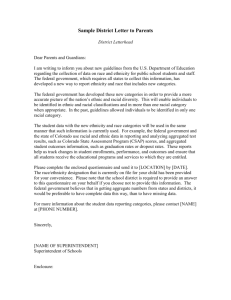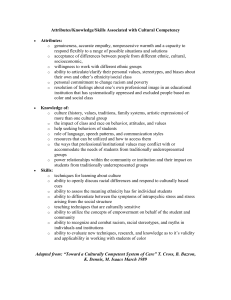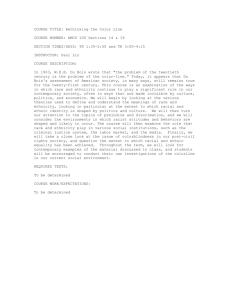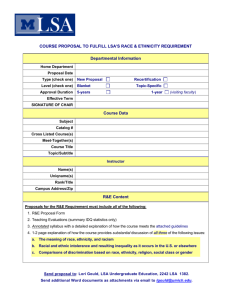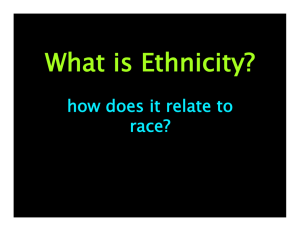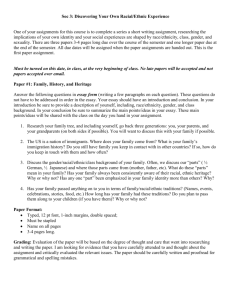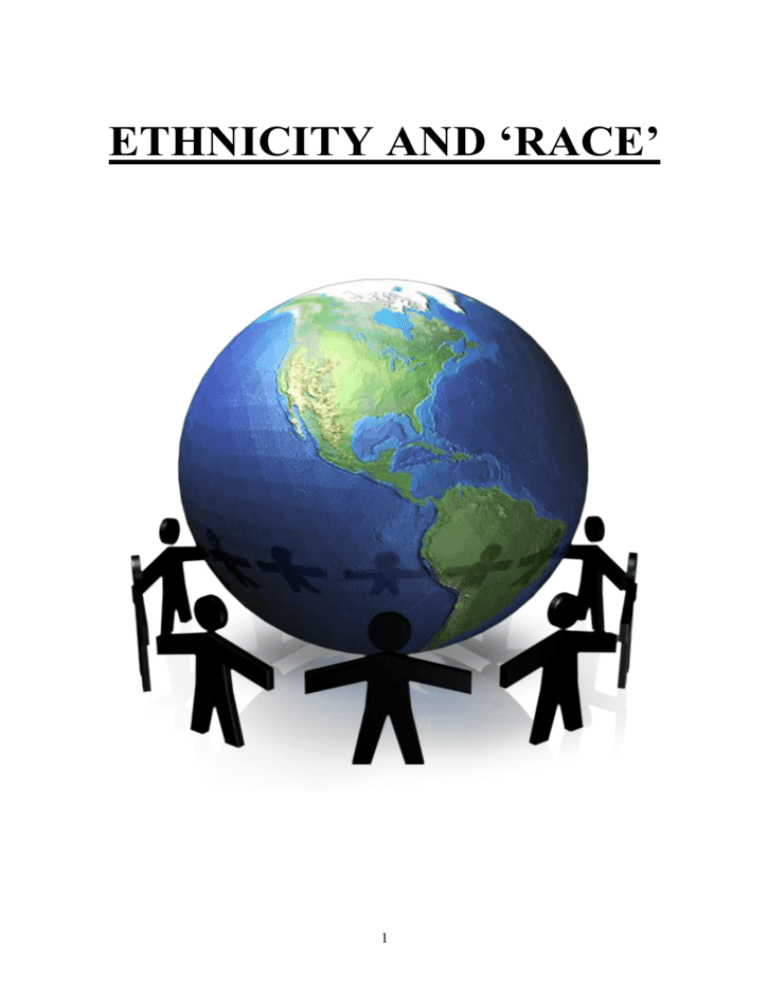
ETHNICITY AND ‘RACE’
1
Timetable
Week 14
Week 15
Week 16
Week 17
Week 18
Week 19
Week 20
Week 21
Week 22
Week 23
Week 24
Introduction to ‘race’ and racism
The contested topic of institutional racism
‘Whiteness’: an ethnicity or identity?
Gendered nationalism and imagined communities
Historical and modern slavery
Migration and diasporas
The age and ideologies of Empires
Colonial conquests: White settler societies and indigenous populations
Apartheid and Post Apartheid.
Revision and essay workshops
Essay submission
Module Content
This module will explore the concepts of ‘race’, racism, ethnicity (religion and language),
identity and nationalism in an historical and comparative manner. It will be concentrating on
issues of power and domination, for example it will consider the legacy that imperial rule has
left on social structures.
These are general texts that will be useful through the module.
Back, L & Solomos J (eds) (1999) Theories of Race and Racism: A Reader London,
Routledge
Mason D (2000) Race and ethnicity in modern Britain Oxford, Oxford University Press
Mac an Ghaill, M. (1999) Contemporary racisms and ethnicities: social and cultural
transformations. Buckingham: Open University Press.
Spencer S (2006) Race and ethnicity, culture, identity and representation London, Routledge
A useful reference book is:
Bolaffi G et al (eds) (2003) Dictionary of race, ethnicity and culture London, Sage
2
Method of Learning and Teaching:
The lectures will be divided into 2 parts. The first will cover the core course material,
delivered in a standard lecture format. The second will vary from week to week, but will
include case study material, presentations and group debates. It is essential that you have done
the reading before you attend the class. You should read at least 2 articles, the required
reading and one from the secondary reading list. The key reading has often been chosen to
interest you in the topic under consideration. It will not give you an overview of that week's
topic. Overviews are more likely to be found in general textbooks rather than journal articles
or monographs.
The reading list for each week is quite to long to make sure that everyone can find something
in the library. Whilst you are not expected to read all of the secondary reading, the more you
read the more you make will progress on this module and in sociology in general. The
secondary reading list also allows you to choose particular articles that may be of interest to
you. Many of the articles listed are relevant in more than one week. However do not feel
constrained by the reading list. You may find items not on the list that may be useful to you.
Get into the habit of noticing what books are housed under the same catalogue number in
the library as the one you are looking for
Get into the habit of following up references in the texts you are reading- they might be
more interesting that the ones on the list
Notice the name of the journals you turn to. Read the titles and/or abstracts of the volume
you are looking at and follow your own interests.
3
Module Learning Outcomes:
a) Knowledge and Understandings: students will
be able to demonstrate familiarity with the main theoretical approaches to the study of
ethnicity and ‘race’.
acquire knowledge of some of the more significant contributions in terms of features
of ethnicity, multiculturalism, ‘race’ and nationalism.
understand how ethnicity and ‘race’ as concepts have evolved
b) Cognitive and intellectual skills: Students will be able to
reflect critically upon the various theoretical approaches to the study of ethnicity and
‘race’.
create linkages between social theory and case studies.
work within the often ambiguous and contradictory nature of the topic.
c) Professional/Subject Specific skills
ability to read and understand sociological texts
ability to use theory to help understand case studies, events portrayed in the media and
personal experiences
ability to bring the issues of ethnicity and ‘race’ to bear on other areas of study
d) Transferable skills
gathering, organisation and deployment of information and evidence
communicate their ideas in a coherent and sensible form
developing fluent and effective analytical writing skills
Method & Type of Assessment:
Assessment is via written coursework to be submitted on Friday of week 24. The written
coursework comprises an essay of between 1,750 and 2,000 words. Essay titles will be given
out during the module.
You will be expected to use at least 3 academic sources in your assessed essay.
4
Week 14
Introduction to ‘race’ and racism
This week gives a brief overview of the module and talks through some of the key concepts
and definitions which will be looked at during the weeks ahead. There is no required reading
this week but you may like to follow up the discussions by looking at the following texts.
Back, L & Solomos J (eds) (1999) Theories of Race and Racism: A Reader London,
Routledge
Mason D (2000) Race and ethnicity in modern Britain Oxford, Oxford University Press
chapter 1
Mac an Ghaill, M. (1999). Contemporary racisms and ethnicities: social and cultural
transformations. Buckingham: Open University Press. Introduction
Solomos J (2003) Race and racism in Britain Basingstoke, Palgrave Macmillan 3rd ed
Introduction
Spencer S (2006) Race and ethnicity, culture, identity and representation London, Routledge
Eriksen, TH (2002) Ethnicity and nationalism London, Pluto Press
5
Week 15
The contested topic of institutional racism
This week will look at contemporary theories of ‘race’ and racism by focusing on the
contested concept of institutional racism. It will look at the background to the Macpherson
inquiry into the events surrounding the death of Stephen Lawrence and the debates that arose
after the inquiry.
Key Reading
Anthias F (1999) 'Institutional Racism, Power and Accountability' Sociological
Research Online, vol. 4, no. 1,
<http://www.socresonline.org.uk/socresonline/4/lawrence//anthias.html
Pick one of these to read
Alexander C (2002) ‘Beyond black: re-thinking the colour/culture divide’ Ethnic and Racial
Studies Vo 25, No 4 pp552 – 571
Gilroy, P (2004) Between camps, nations, cultures and the allure of race London, Routledge,
chapter 1
Gold SJ (2004) ‘From Jim Crow to racial hegemony: Evolving explanations of racial
hierarchy’ Ethnic and Racial Studies Vol. 27 No. 6 pp. 951-968
Lewis G (2005) ‘Welcome to the margins: Diversity, tolerance, and policies of exclusion’
Ethnic and Racial Studies Vol. 28 No. 3 pp. 536-558
Mac an Ghail M (1999) Contemporary Racisms and Ethnicities Buckinham, Open University
Press chapter 3
Miles, R (2003) Racism London, Routledge chapter 3
Myers K & Williamson B.S (2001) ‘Race talk: the perpetuation of racism through private
discourse’ Race & Society 4 pages 3–26
Solomos J (1999) 'Social Research and the Stephen Lawrence Inquiry' Sociological Research
Online, vol. 4, no 1, <http://www.socresonline.org.uk/socresonline/4/lawrence/solomos.html>
Steinberg S (1998) ‘The role of social science in the legitimation of racial hierarchy’ Race
and Society Volume 1, Issue 1, Pages 5-14
6
Week 16
‘Whiteness’: an ethnicity or identity?
This week will consider the usefulness of the concept of ethnicity and its relationship to other
aspects of identity. It will have a particular focus on whiteness and look at the ways whiteness
can screen privilege but it can also hide discrimination.
Key Reading
Franks M (2000) Crossing the borders of whiteness? White Muslim women who wear
the hijab in Britain today Ethnic and Racial Studies Volume 23, Number 5917 - 929
Pick one of these to read
Bonnett A (2000) White identities, historical and international perspectives : Harlow, Prentice
Hall chapter 2,
Bergman W (2002) ‘Anti-Semitism in a united Germany’ In Layton-Henry Z and Wilpert C
(eds) Challenging racism in Britain and Germany Basingstoke, Palgrave Macmillan,
Bush M (2004) Breaking the code of good intentions, everyday forms of whiteness : Lanham,
Rowman & Littlefield chapter 6
Byrne B (2006) White lives London Routledge Chapter 1
Frankenburg, R (1993) White women, race matters, the social construction of whiteness
London Routledge chapter 7
Hawes, D and Perez B (1996) The gypsy and the state, the ethnic cleansing of British society
Bristol, Policy Press 2nd edition chapter 7
Hickman MJ (1998) ‘Reconstructing deconstructing 'race': British political discourses about
the Irish in Britain’ Ethnic and Racial Studies Vol 21, No 2 pp 288 - 307
McKinney KD (2003) ‘“I Feel ‘Whiteness’ When I Hear People Blaming Whites:” Whiteness
as cultural victimization’ Race and Society Vol 6 p 39–55
MacLaughlin J (1999) ‘Nation-Building, Social Closure and Anti-Traveller Racism in
Ireland’ Sociology, Vol. 33, No. 1, 129-151
O’Brien E (2000) ‘Are we supposed to be colorblind or not? Competing frames used by
whites against racism’ Race & Society Vol 3 No 1 pp41–59
Pierce JL. (2003) ‘“Racing for Innocence”: Whiteness, Corporate Culture, and the Backlash
Against Affirmative Action’ Qualitative Sociology Vol. 26, No. 1
7
Week 17
Gendered nationalism and imagined communities
This week will look at two particular aspects of nationalism. It will consider Anderson’s
theory of imagined communities and look at Yuval-Davies work on gender and nation.
Together they will explore both the discursive construction and embodied consequences of
nationalism.
Key Reading
Yuval-Davis N (1996) ‘Women and the biological reproduction of ‘the nation’’’
Women's Studies International Forum, Vol. 19, Nos. 1/2, pp 17-24
Pick one of these to read
Anderson, B (1991) Imagined communities, reflections on the origin and spread of
nationalism London, Verso
Or
Extract from ‘Imagined communities’ in Hutchinson J and Smith AD (eds) (1994)
Nationalism Oxford, Oxford University Press
Or
Extract from ‘Imagined communities’ in Guibernau M and Rex J (eds) (1997) The Ethnicity
Reader Cambridge, Polity Press
Anthias F and Yuval-Davis N (1992) Racialized Boundaries London, Routledge chapter 2
Bleich E (1999) ‘Re-imagined communities? Education policies and national belonging in
Britain and France’. In Geddes A and Favell (eds) The politics of belonging, migrants and
minorities in contemporary Europe Aldershot, Ashgate
Brown D (2000) Contemporary nationalism, civic, ethnocultural, and multicultural politics
London, Routledge, chapter 2
Miles R (1993) Racism after 'race relations' London, Routledge chapter 2
Nagel J (1998) ‘Masculinity and nationalism: gender and sexuality in the making of nations’
Ethnic and Racial Studies Vol 21, No 2 pp242 – 269
Solomos J (2003) Race and Racism in Britain Basingstoke Palgrave Chapter on Racism,
Nationalism and Political Action
Triandafyllidou A (1998) ‘National identity and the 'other'’ Ethnic and Racial Studies Vol 21,
No 4 pp593–612
Yuval-Davies N (1997) Gender and Nation London, Sage chapter 2
8
Week 18
Historical and modern slavery
This week will look at the issue of forced migration within capitalism. It will consider both
historical slavery and its ongoing effects, and modern day forms of forced labour.
Key Reading
Richardson D (2005) Slavery and Bristol’s ‘Golden Age’ Slavery and Abolition
Vol. 26, No. 1, pp. 35–54
Pick one of these to read
Bales K (2005) Understanding global slavery, a reader London, University of California Press
chapter 1
Bales K (1999) Disposable people, new slavery in the global economy London, University of
California Press chapter 1
Blackburn, R (1997) The making of New World slavery, from the baroque to the modern
1492-1800 London, Verso chapter 6
Beyrer C (2001) ‘Shan women and girls and the sex industry in Southeast Asia; political
causes and human rights implications’ Social Science & Medicine Vol 53, No 4
Craton M (1982) ‘Slave culture, resistance and the achievement of emancipation in the British
West Indies 1783-1838’ In Walvin J (ed) Slavery and British society 1776-1846 London,
Macmillan
Fenton, S (1999) Ethnicity, racism, class and culture Basingstoke, Macmillan chapter 4
Follett R (2005) ‘‘Lives of Living Death’: The Reproductive Lives of Slave Women in the
Cane World of Louisiana’ Slavery and Abolition Vol. 26, No. 2, pp. 289–304
Kushnick, L (1998) Race, class and struggle, essays on racism and inequality in Britain, the
US and Western Europe London, Rivers Oram chapters 7 and 9
Meillassoux C (1982) ‘The role of slavery in the economic and social history of sahib-sudanic
Africa’ in Inikori J.E (ed) Forced migration, the impact of the export slave trade on African
societies London, Hutchinson University Library
Miers S (2003) Slavery in the twentieth century, the evolution of a global problem Walnut
Creek, AltaMira Press chapter 24
O’Connell J (2005) Children and the Global Sex Trade Cambridge Polity Press chapter 4
Smith M (1998) Debating Slavery: Economy and Society in the Antebellum American South
Cambridge, Cambridge University Press Chapter 3
Wilson W J (1973) Power, racism, and privilege, race relations in theoretical and
sociohistorical perspectives London, Collier-Macmillan chapter 5
Also see Anti-Slavery International Reports (http://www.antislavery.org)
9
Week 19
Migration and diasporas
This week we will look at the ways in which migration acts to both maintain and alter culture.
It will consider how ideas about a homeland help construct diasporas.
Key Reading
Falzon MA (2003) 'Bombay, Our Cultural Heart': Rethinking the relation between
homeland and diaspora Ethnic and Racial Studies Vol 26, No 4 pp662 – 683
Pick one of these to read
Anthias F (1998) ‘Evaluating `Diaspora': Beyond Ethnicity?’ Sociology, Vol. 32, No. 3, 557580
Bloch A (2002) The Migration and Settlement of Refugees in Britain Basingstoke Palgrave
chapter 4
Brah, A (1996) Cartographies of diaspora, contesting identities London, Routledge chapter 8
Brubaker R (2005 ) ‘The 'diaspora' diaspora’ Ethnic and Racial Studies Vol 28, No 1 pp1 – 19
Bhachu P (2005) ‘Diaspora Politics Through Style: Racialized and Politicized Fashion in
Global Markets’ In Alexander C and Knowles C (eds) Making Race Matter:Bodies, Space
and Identity Basingstoke Palgrave
Clifford J (1997) ‘Diasporas’ In Guibernau M and Rex J (eds) The Ethnicity Reader
Cambridge, Polity Press
Kalra V (2005) Diaspora and Hybridity London, Sage chapter 2
Reed K (2005) ‘Comparing New Migration with Old: Exploring the Issue of Asylum and
Settlement’ In Alexander C and Knowles C (eds) Making Race Matter:Bodies, Space and
Identity Basingstoke Palgrave
Soysal YN (2000) ‘Citizenship and identity: living in diasporas in post-war Europe?’ Ethnic
and Racial Studies Volume 23, Number 1 pp1 - 15
Spencer S (2006) Race and ethnicity, culture, identity and representation London, Routledge
chapter 8
Temple B (1999) ‘Diaspora, diaspora space and Polish women’ Women’s Studies
International Forum, Vol. 22, No. 1, pp. 17–24,
Thompson K (2002) ‘Border Crossings and Diasporic Identities: Media Use and Leisure
Practices of an Ethnic Minority’ Qualitative Sociology, Vol. 25, No. 3 p409-418
Vergès F (2001) ‘Vertigo and Emancipation, Creole Cosmopolitanism and Cultural Politics’
Theory, Culture & Society Vol. 18 No (2–3): 169–183
Walter B (2004) ‘Irish women in the diaspora: Exclusions and inclusions’ Women’s Studies
International Forum 27 No 4 pp369– 384
10
Week 20
The age and ideologies of Empires
This week will look at the development and ideologies of different Empires and different
forms of imperial rule by focusing on French and British colonies. It will illustrate how ideas
about racial superiority were an important element of domination and the similarities to the
concept of a ‘master race’ within German fascism.
Key Reading
Peté S and Annie Devenish (2005) ‘Flogging, Fear and Food: Punishment and
Race in Colonial Natal’ Journal of Southern African Studies, Vol 31, No 1, March
Pick one of these to read
Aldrich R and Connell J (1992) France's overseas frontier Cambridge, Cambridge University
Press chapter 2
Christie, C (1998) Race and nation, a reader London, Tauris chapter 7
Hall, C (1992) White, male and middle class, explorations in feminism and history Oxford,
Polity Press chapter 9
Hannaford, I (1996) Race, the history of an idea in the West London, Johns Hopkins
University Press chapter 10
Lusane, C (2004) ‘Nazi-sterilization of Afro-Germans’ in Ifekwunigwe JO (ed) 'Mixed race'
studies, a reader London, Routledge
Margalit G (1999) ‘The Representation of the Nazi Persecution of the Gypsies in German
Discourse after 1945’ German History, Vol 17, No 2, pp. 221-240
McClintock, A (1994) Imperial leather, race, gender and sexuality in the colonial contest
London, Routledge, chapter 1
Phillips R (2002) ‘Imperialism and the regulation of sexuality: colonial legislation on
contagious diseases and ages of consent’ Journal of Historical Geography, 28, 3 pp339-362
Quinn, F (2000) The French overseas empire London, Praeger chapters 4-5
Hutton C (2005) Race and the Third Reich Cambridge, Polity Press chapter 1 & 2
Smith, W (1986) The ideological origins of Nazi imperialism Oxford, Oxford University
Press chapter 10
Thapar-Björkert S and Ryan L (2002) ‘Mother India/Mother Ireland: comparative Gendered
dialogues of colonialism and Nationalism in the early 20th century’ Women’s Studies
International Forum, Vol. 25, No. 3, pp. 301 – 313,
11
Week 21
Colonial conquests: White settler societies and indigenous populations
This week will focus on the complex relationship between the colonisers and the colonised,
and consider how the relationship has changed. It will look at the campaigns for
independence and consider the position of indigenous communities in white settler societies.
Key Reading
Lea T (2005) ‘The work of forgetting: Germs, aborigines and postcolonial expertise in
the Northern Territory of Australia’ Social Science & Medicine 61 1310-1319
Pick one of these to read
Anderson W (2003) The Cultivation of Whiteness: Science, Health and Racial Destiny in
Australia New York Basic Books chapter 6
Cowlishaw G (2004) Blackfellas, Whitefellas and the hidden injuries of Race Oxford
Blackwell Chapter 6
Chamberlain M (1999) Decolonization: the fall of the European Empires Oxford Blackwell
chapter 1 & 2
Darby P (2000) ‘Postcolonialism’ In Darby P (ed) At the edge of international relations,
postcolonialism, gender and dependency London, Cassell,
Mason D (2000) Race and Ethnicity in Modern Britain Oxford, Oxford University Press
chapter 3
Moran A (2002) ‘As Australia decolonizes: indigenizing settler nationalism and the
challenges of settler/indigenous relations’ Ethnic and Racial Studies Volume 25, Number 6,
pp1013-1042
Niyogi C (2006) ‘Orientalism and Its Other(s): Rereading Marx on India’ In Niyogi C (ed)
Reorienting Orientalism London Sage
Nzenza S (2000) ‘Women in postcolonial Africa: between African men and western
feminists’ In Darby P (ed) At the edge of international relations, postcolonialism, gender and
dependency London, Cassell
Pearson D (2002) ‘Theorizing citizenship in British settler societies’ Ethnic and Racial
Studies Vol 25, No 6 pp989 – 1012
Ringer B & Lawless E (1989) Race-ethnicity and society London, Routledge chapter 5
Said E (1978) Orientalism London Routledge chapter 1
Spencer S (2006) Race and ethnicity, culture, identity and representation London, Routledge
chapter 6
Wilmer F (1997) ‘First nations in the USA’ In Guibernau M and Rex J (eds) The Ethnicity
Reader Cambridge, Polity Press
12
Week 22
Apartheid and Post Apartheid
This week will focus on South Africa as a case study. It will consider the rise of apartheid and
it ongoing legacy in post-apartheid South Africa.
Key Reading
Durrheim K & Dixon J (2001) The role of place and metaphor in racial exclusion: South
Africa's beaches as sites of shifting racialization Ethnic and Racial Studies Vol 24, No 3
pp433 - 450
Pick one of these to read
Baldwin-Ragaven L, London L & De Gruchy J (2001) ‘Learning From Our Apartheid Past:
human rights challenges for health professionals in contemporary South Africa’ Ethnicity &
Health, 2000; 5(3/4): 227–241
Barbarin O & Richter L (2001) Mandela's Children London, Routledge Chapter 1
Clark N and Worger W (2004) South Africa: The Rise and Fall of Apartheid Harlow, Pearson
Longman Chapter 3 and 6
Durrheim K and Dixon J (2000) Theories of culture in racist discourse Race & Society Vol 3
pages 93–109
Gathiram N & Hemson D. (2002) ‘Transformation of welfare? Race, class, and gender in the
management of welfare agencies in South Africa’ Community Development Journal, Vol 37,
No 3, pp. 209-219
Franchi V and Swart T (2003) ‘From apartheid to affirmative action: the use of ‘racial’
markers in past, present and future articulations of identity among South African students’
International Journal of Intercultural Relations Vol 27 No 2 pp209-236
Khalfani AK and Zuberi T (2001) Racial classification and the modern census in South
Africa, 1911–1996 Race & Society Vol 4 pages 161–176
Walker M (2005) ‘Rainbow nation or new racism? Theorizing race and identity formation in
South African higher education’ Race Ethnicity and Education Vol. 8, No. 2, pp. 129–146
Walker M (2005) ‘Race is nowhere and race is everywhere: narratives from black and white
South African university students in post-apartheid South Africa’ British Journal of Sociology
of Education, Vol 26, No1, pp. 41-54
13

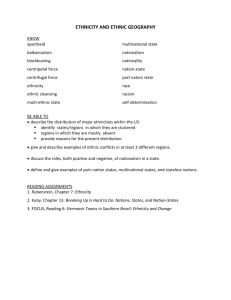
![[SOC 3AC] Niyogi F13 Midterm Exam](http://s3.studylib.net/store/data/008024599_1-cec01b60ef2f28fd40035e6e0b60c3ca-300x300.png)
